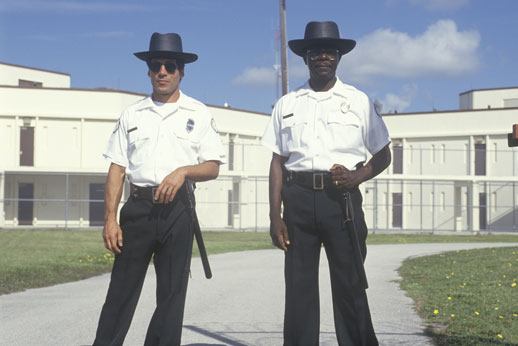
Being a correctional officer is people work. You are not, however, working with ordinary people. Many inmates can't read or write, and a large number have either drinking or drug addiction problems. Some are dangerous, and many have mental problems. All have been arrested, are awaiting a trial or other hearing, or have been convicted of a crime and sentenced to serve time in a correctional facility.
You and your fellow officers work in an environment that is appropriately secure for the type of inmate. This may mean working in a high-security prison or a community-based facility. Most correctional officers work in relatively large institutions located in rural areas, although a significant number work in jails and other smaller facilities located in law enforcement agencies throughout the country.
Let's find out what happens on the job
No matter where correctional officers work, their primary job is to maintain order within the facility and to enforce rules and regulations. In order to do this, they monitor inmates' activities from working and exercising to eating and bathing. Sometimes they have to search inmates and their living quarters for weapons or drugs. The officers also routinely inspect locks, window bars, grille doors, and gates for signs of tampering. They also try to settle disputes between inmates before violence erupts. Correctional officers can never show favoritism and must always report any inmate who violates the rules. The officers usually keep a daily record of their activities.
A few correctional officers hold staff security positions in towers, where they are equipped with high-powered rifles to prevent escapes. There are others who are locked unarmed in a cell-block, alone or with another officer, to directly supervise 50 to 100 inmates during their entire shift.
The pleasures and pressures of the job
When you work as a correctional officer, you have the satisfaction of knowing that you are doing a demanding job that benefits society. At the same time, you are assuring the safety of the inmates. Through formal and informal counseling, officers are always pleased to see they have helped inmates adjust to prison life, return to the outside world, or avoid committing crimes in the future.
Working in a prison or jail can be stressful. The level of tension can be high because the facilities are often overcrowded and understaffed, and the officers may be overworked. Obviously, this work can also be hazardous as there is a risk of being injured or killed by inmates.
Rewards, the pay, and the perks
The job prospects for future correctional officers are excellent as there is a rising demand for people to fill these positions.
According to the American Jail Association, salaries for beginning jail officers range from $13,000 in rural counties to $30,000 or more in large metropolitan counties. Salaries of state correctional officers have about the same range. In 1995, starting salaries for officers on the federal level ranged from $18,700 to more than $20,000.
Correctional officers are usually provided uniforms or a clothing allowance. Most officers are provided with major medical insurance and receive vacation, sick leave, and pension benefits. Officers who work in federal and most state facilities are covered by civil service systems or merit boards. They can retire at age 50 after 20 years of service or at any age after 25 years of service. In the federal system and in some states, correctional officers are represented by labor unions.
David is the leader of an emergency squad (E-Squad) at the prison. These squads are called to handle major disturbances, hostage situations, or escapes. Each of the three E-Squads at the facility has approximately 15 correctional officers. All carry beepers so that they will be able to respond to a crisis quickly. David is member of this special squad. David has joined the E-Squad because he wants to be there if fellow officers need help. He hopes, too, that if he is ever in trouble there will be someone there to help him.
Because it was located on a rocky island in San Francisco Bay, Alcatraz prison became known as "The Rock." This maximum security federal prison opened in 1934 and housed inmates who had proved impossible to handle in other prisons. This included Al Capone, George "Machine Gun" Kelly, and Alvin "Creepy" Karpis. Alcatraz closed in 1963 because of the difficulty of transporting water to the island and waste away from it. Over the years, many stories have developed about life at Alcatraz, especially about the impossibility of escape.
You and a career as a correctional officer
Correctional officers need certain special abilities in order to be able to handle this job, which is both stressful and hazardous. Do you have most of these abilities?
Physical strength
- Ability to subdue unruly inmates
- Ability to stay on your feet for an eight-hour or longer shift
- Ability to work in an overcrowded, noisy environment
- Strength to handle the stress of dealing with criminals
- Strength to work in a tension-filled environment
- Ability to handle inmates fairly
- Ability to think and act quickly
- Good judgment
- Maturity
- Ability to remain alert and aware of your surroundings
- Ability to recognize potentially dangerous situations
- Ability to defuse tense situations with words
- Ability to make quality written and oral reports
If you are interested in a position as a correctional officer, contact:
The American Jail Association 2053 Day Road Hagerstown, MD 21740-9795 301-790-3930 www.americanjail.org
The International Association of Correctional Officers P.O. Box 81826 Lincoln, NE 68501 800-255-2382
Federal Bureau of Prisons, National Recruitment Office 320 First Street, NW, Room 460 Washington, DC 20534 www.usdoj.gov/bop



